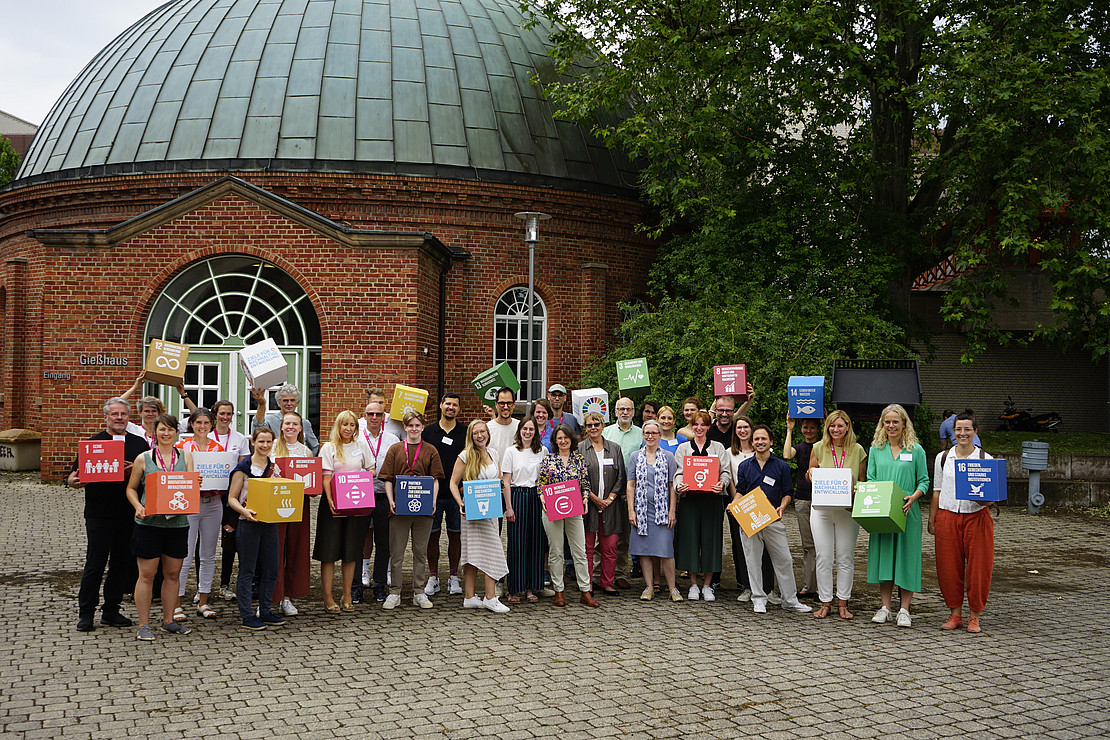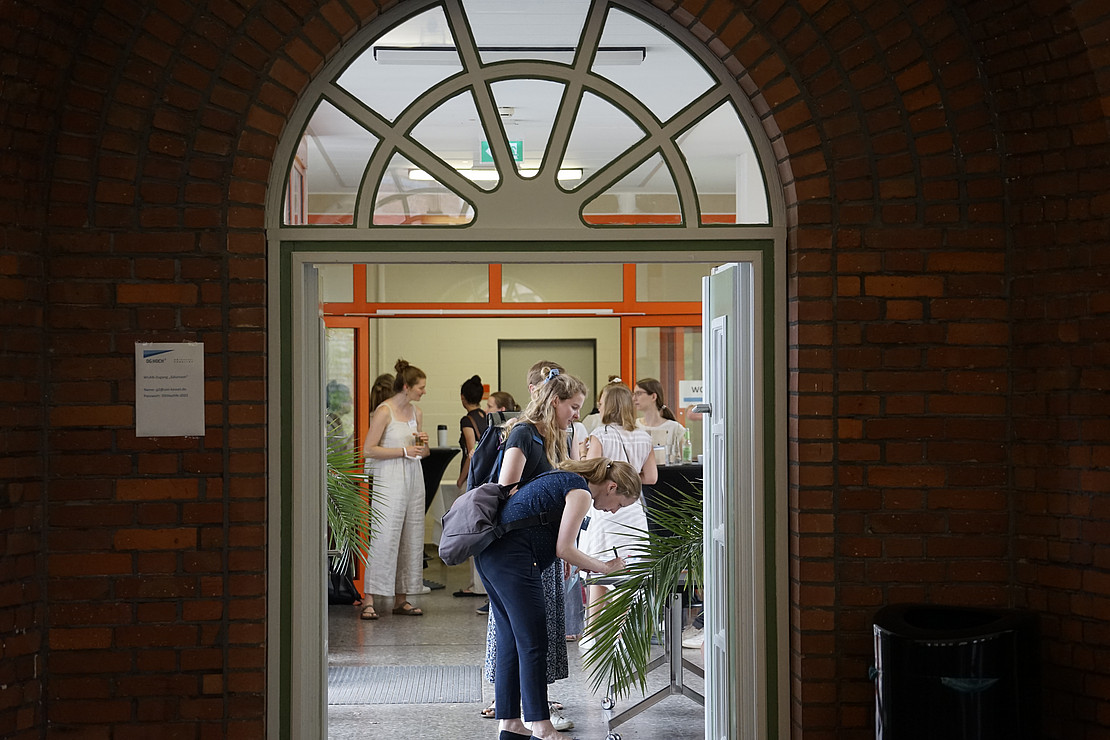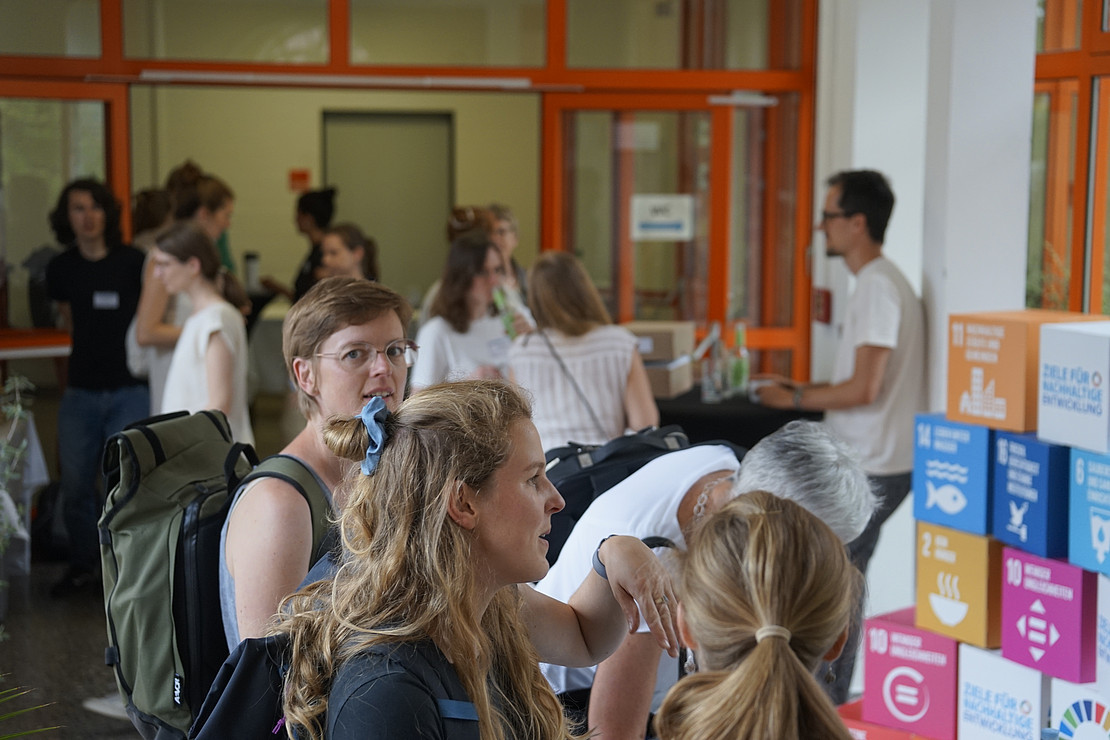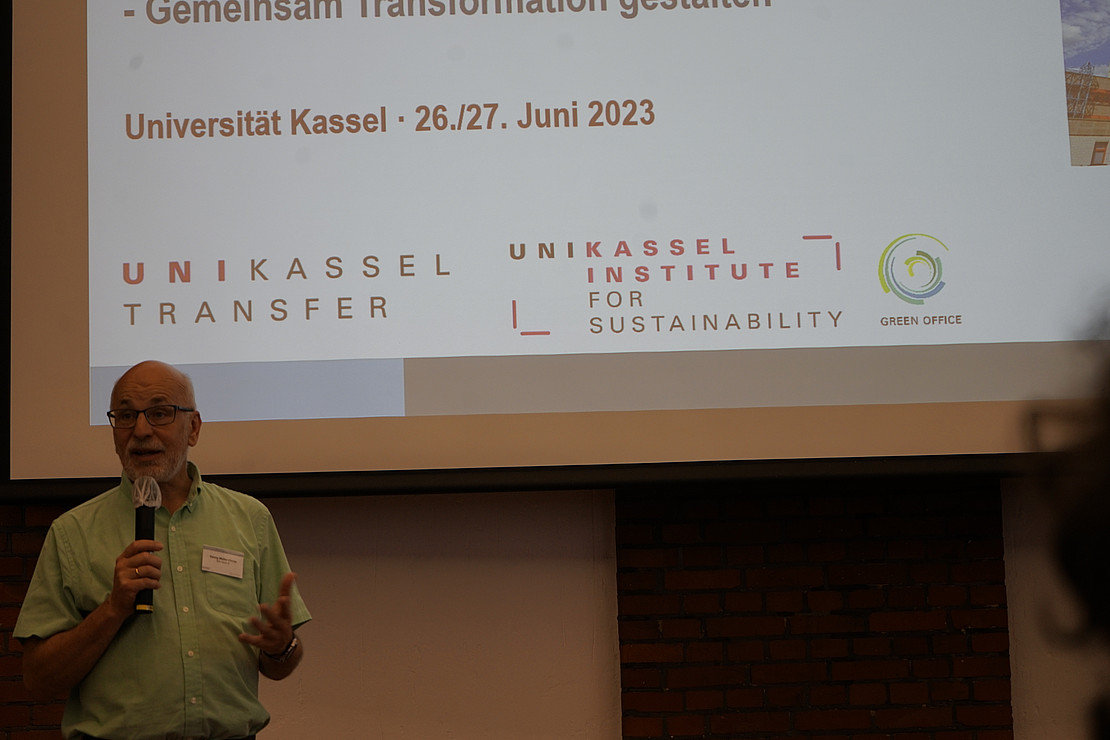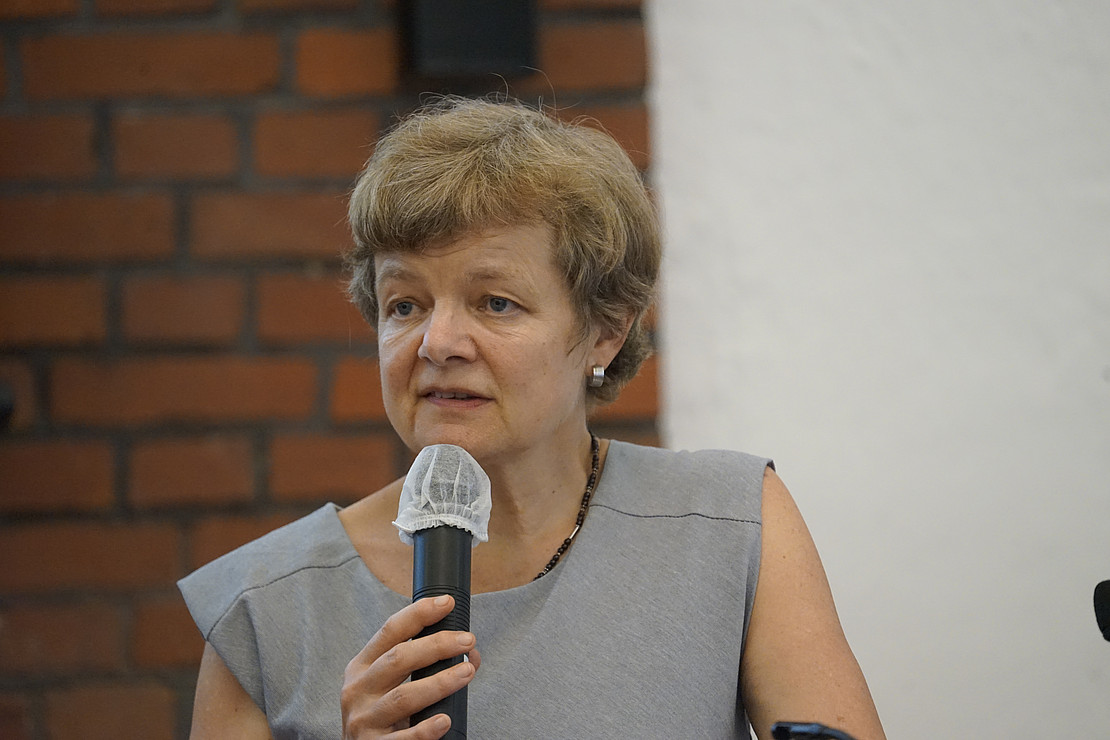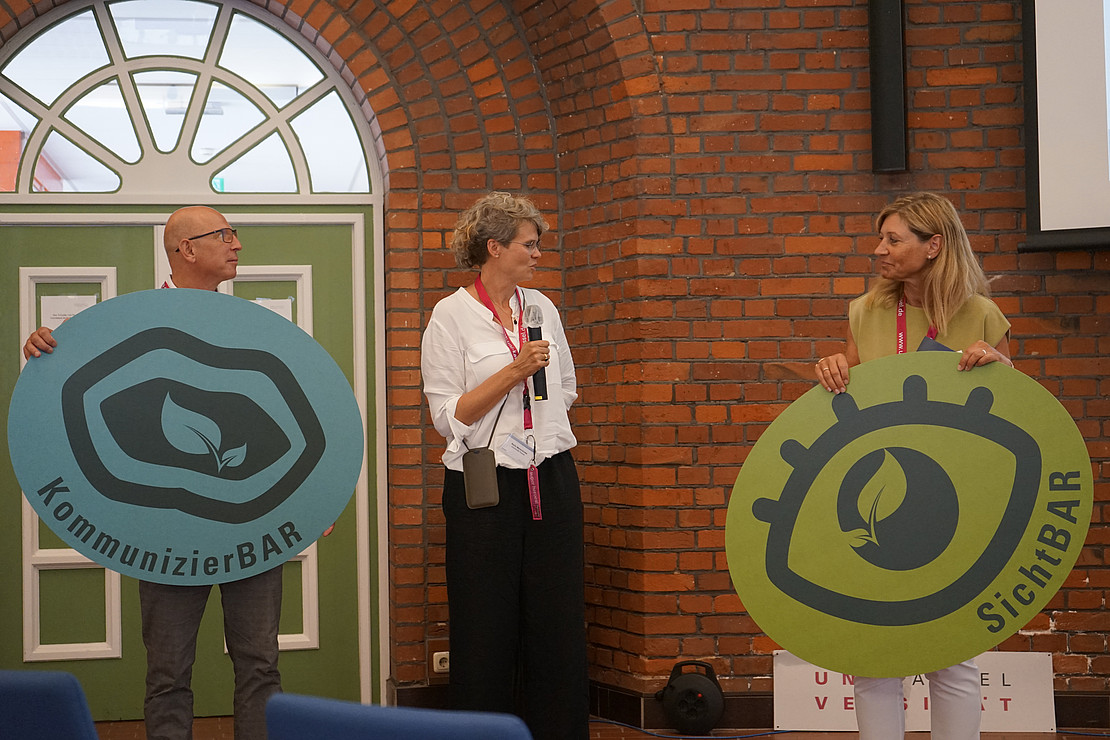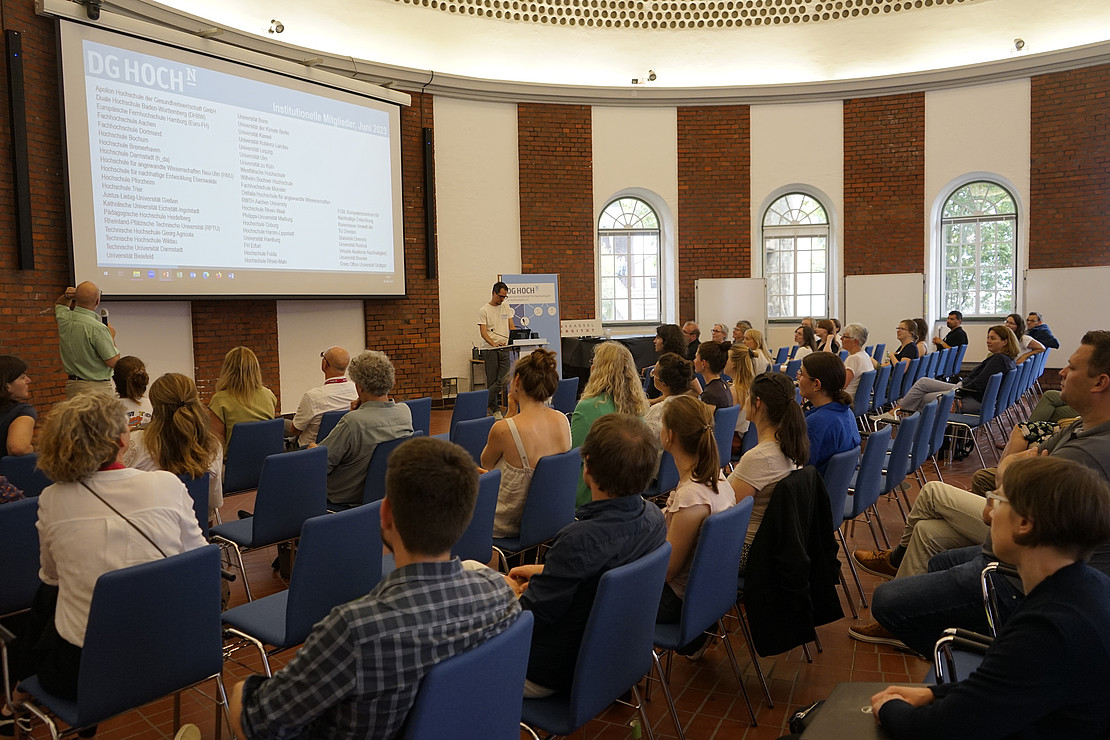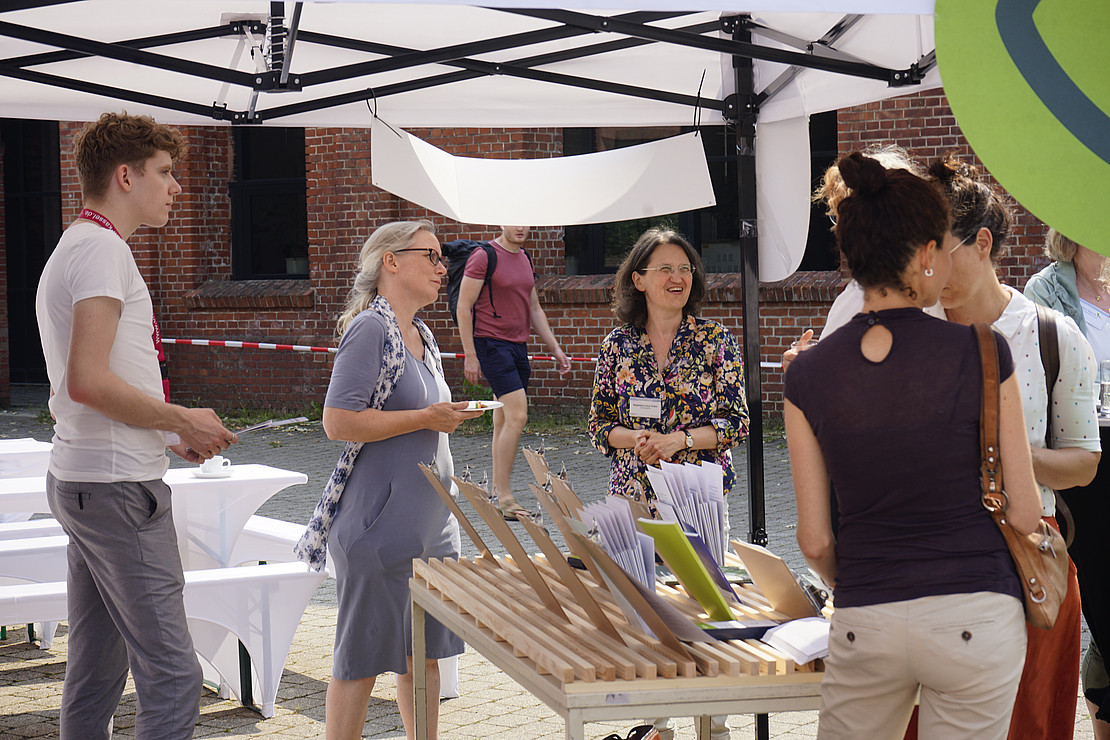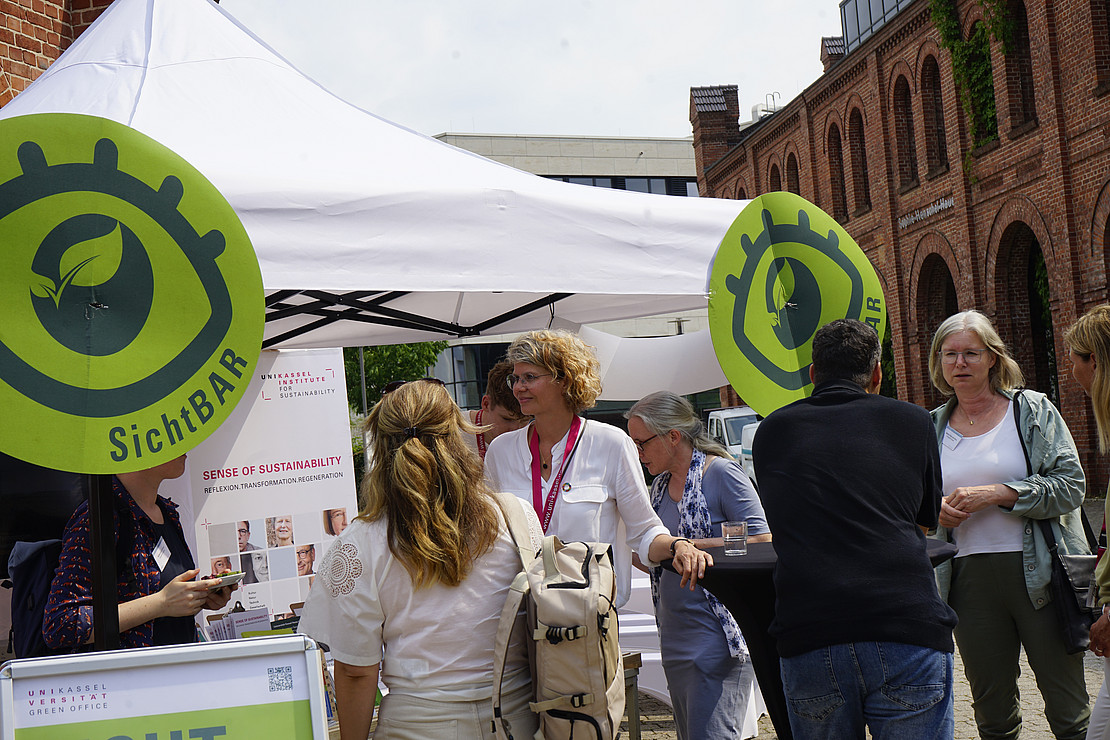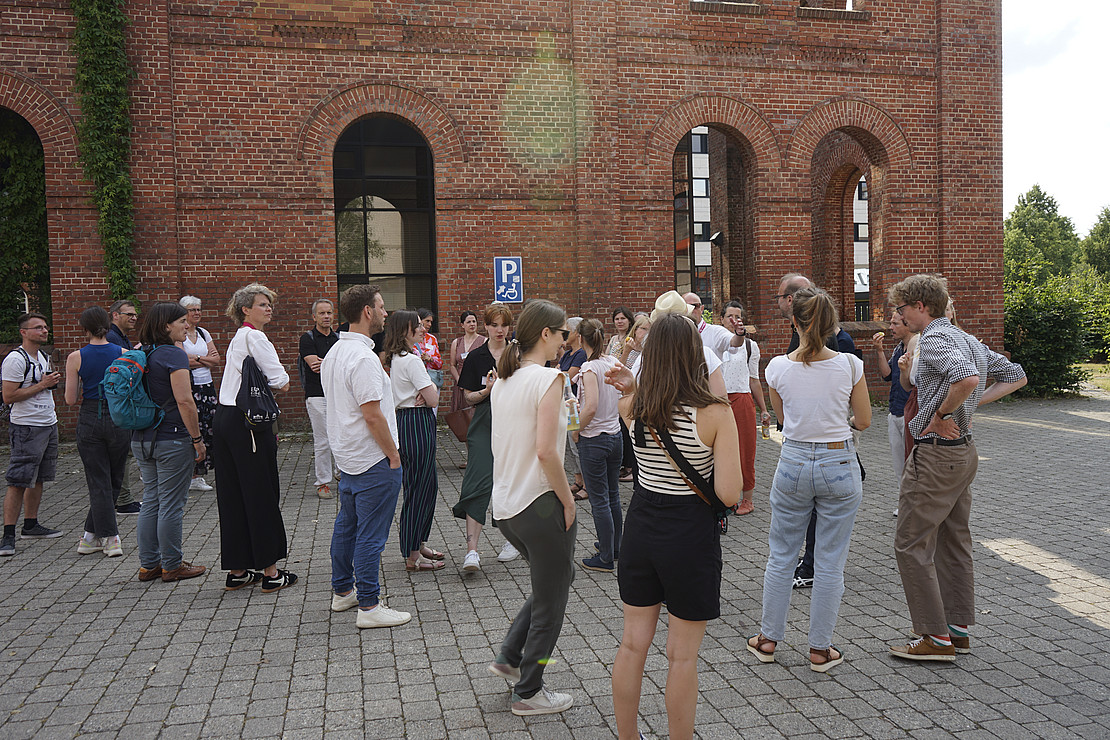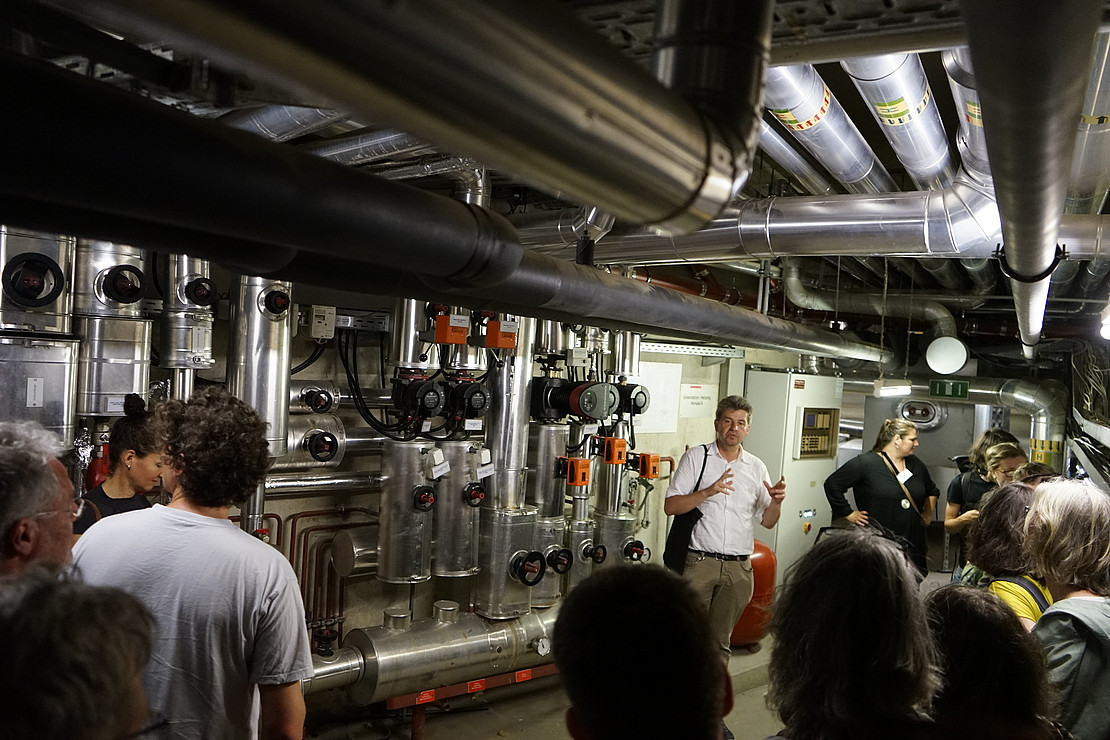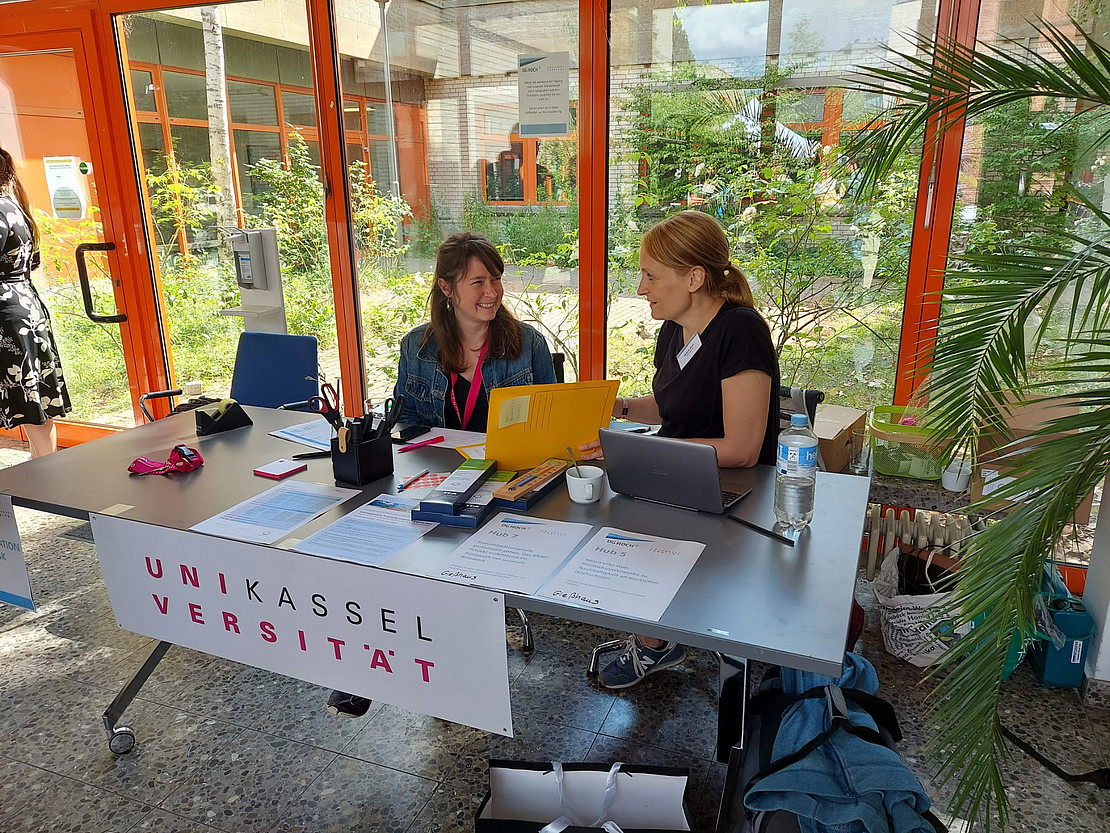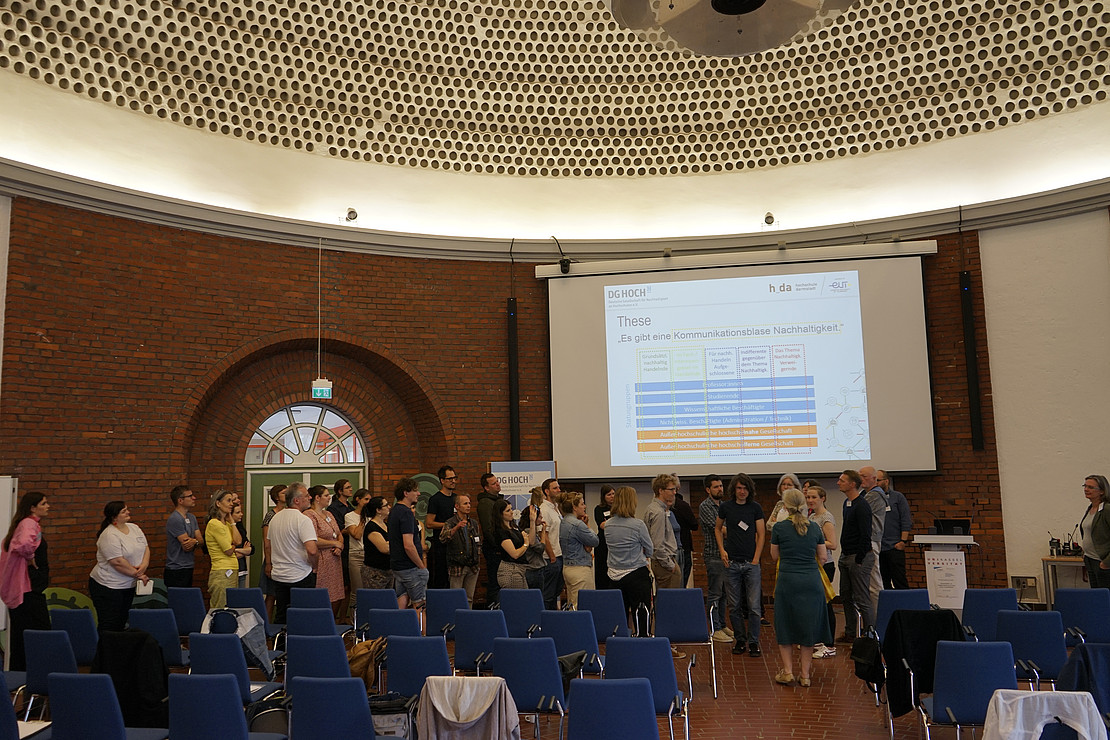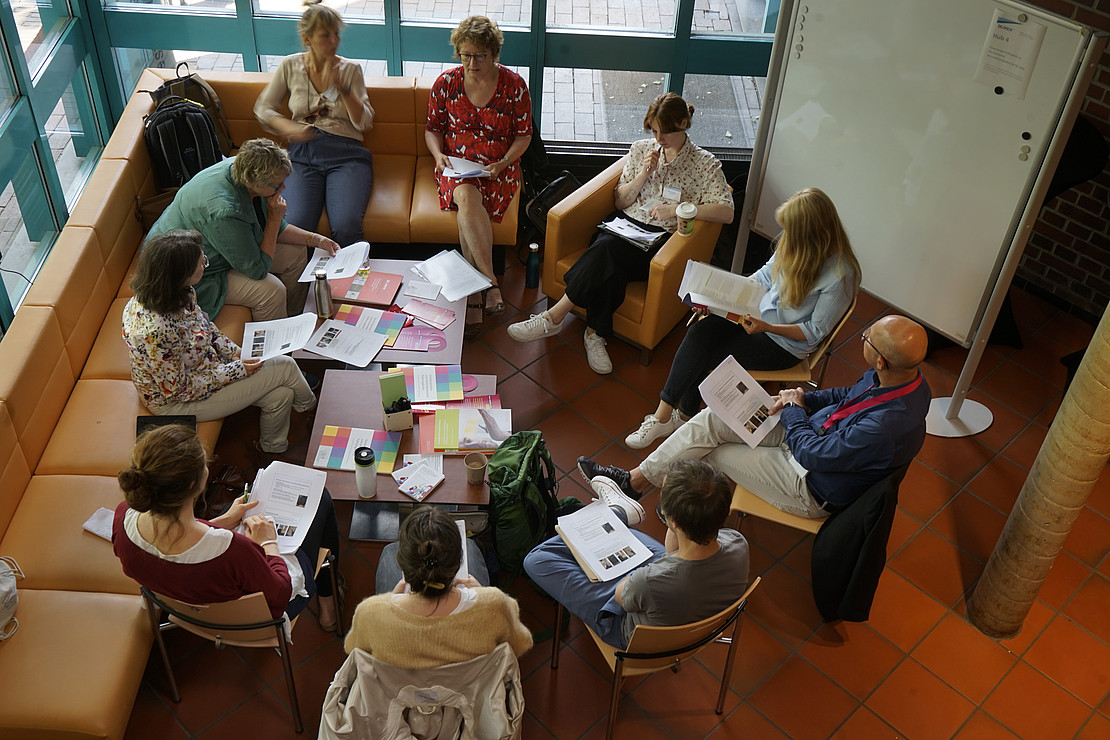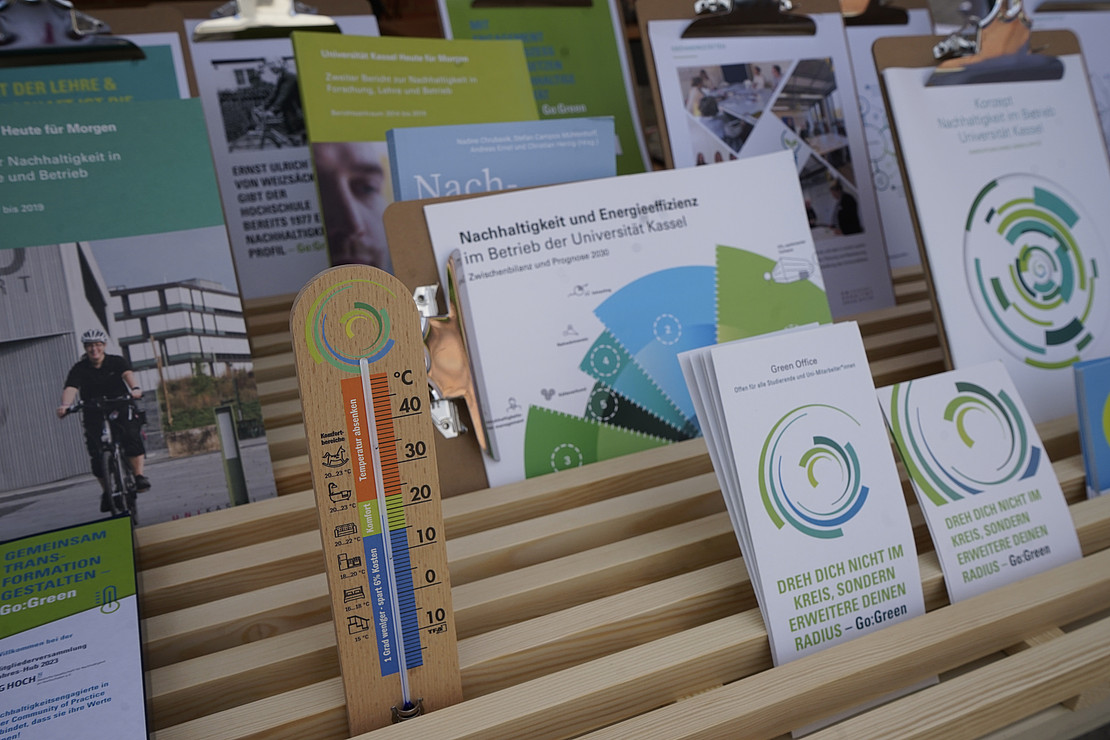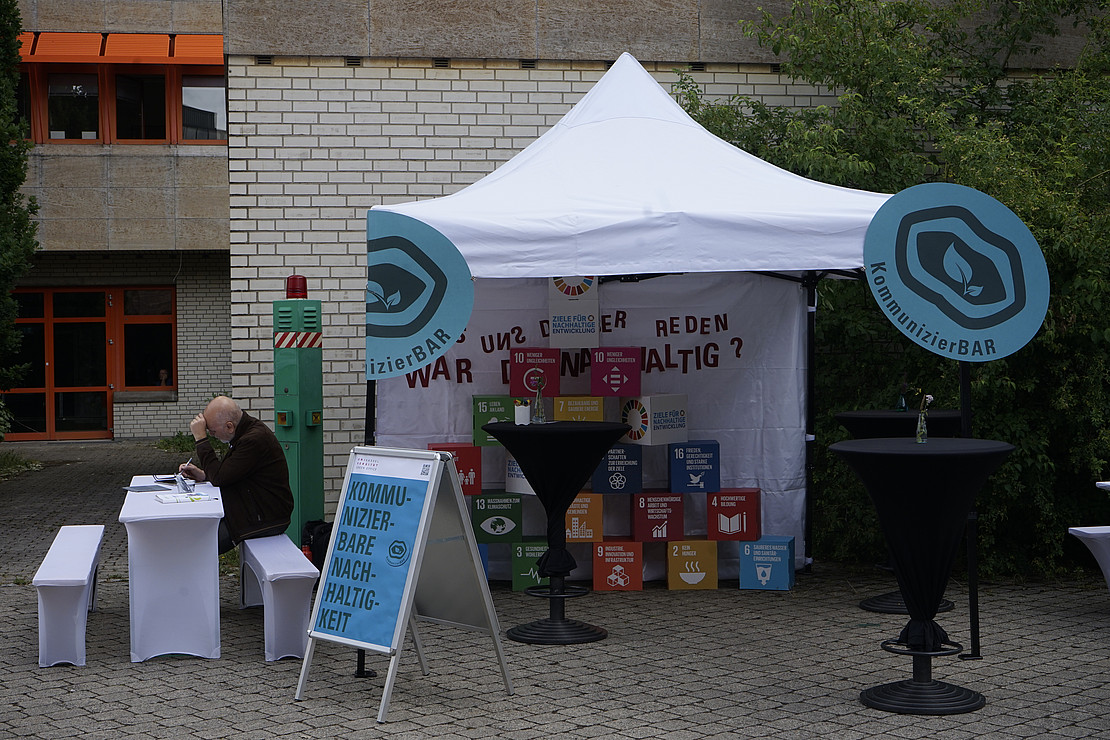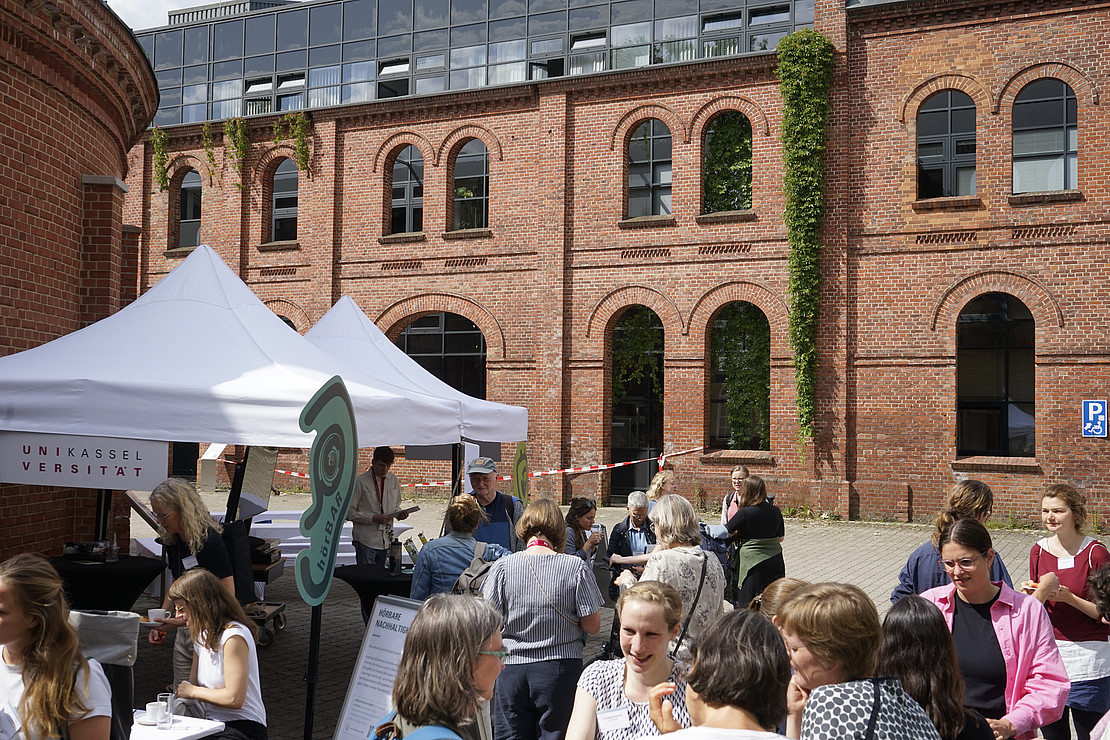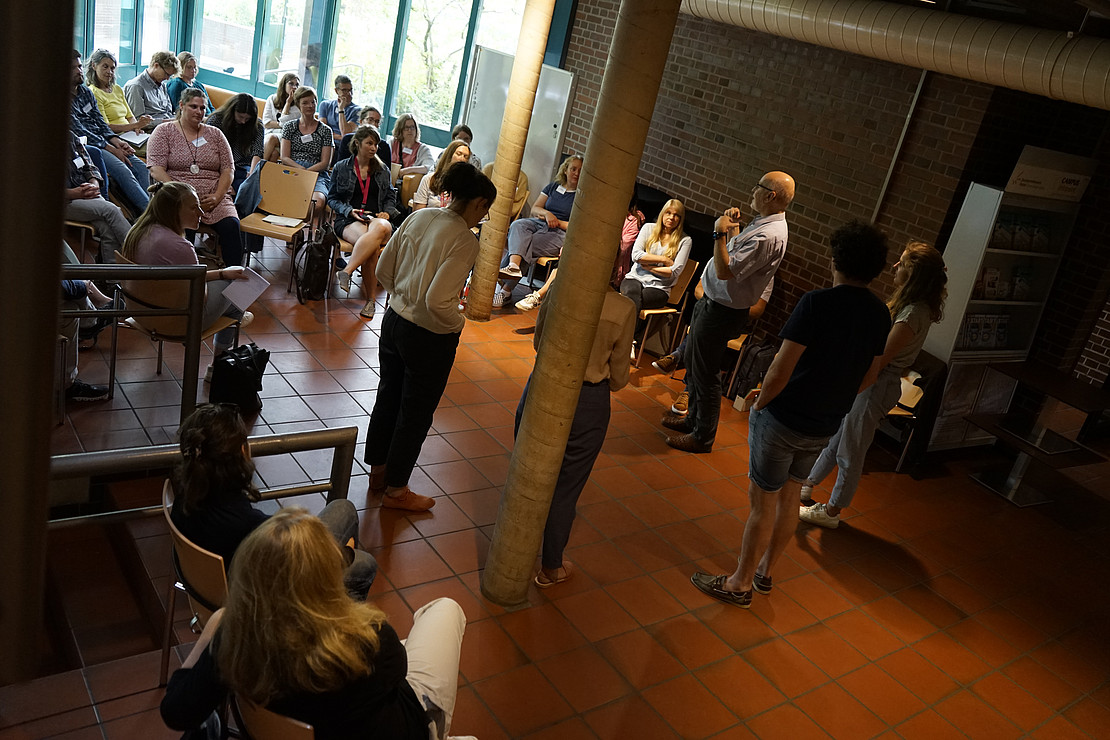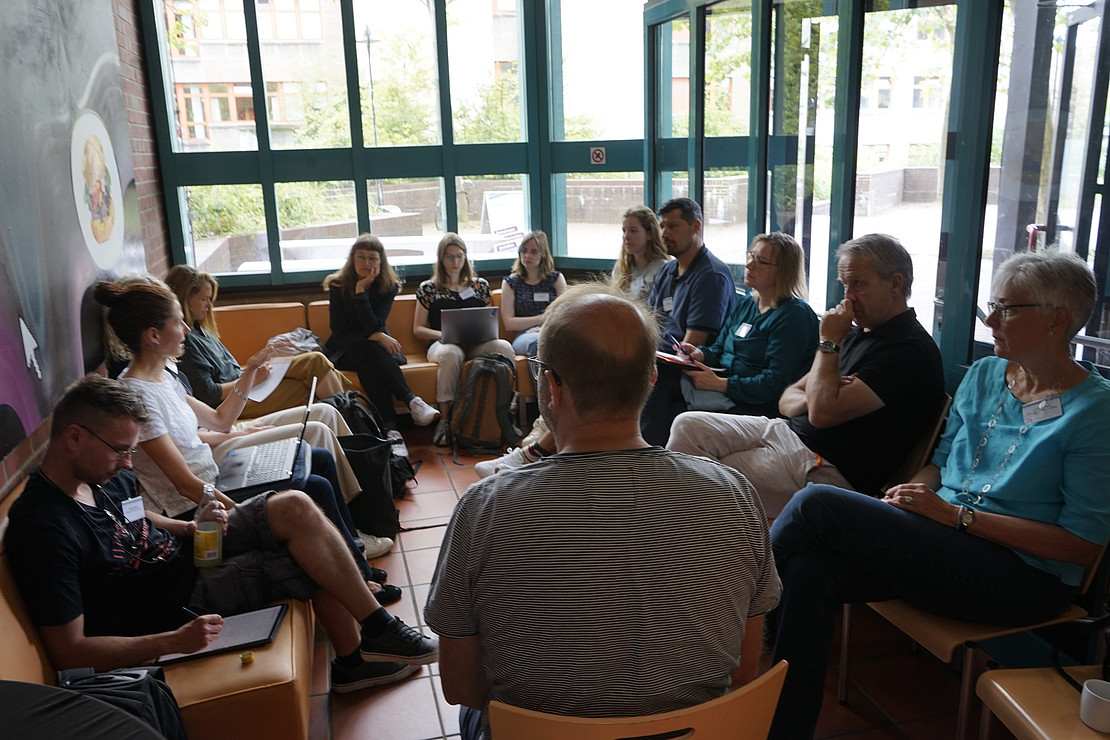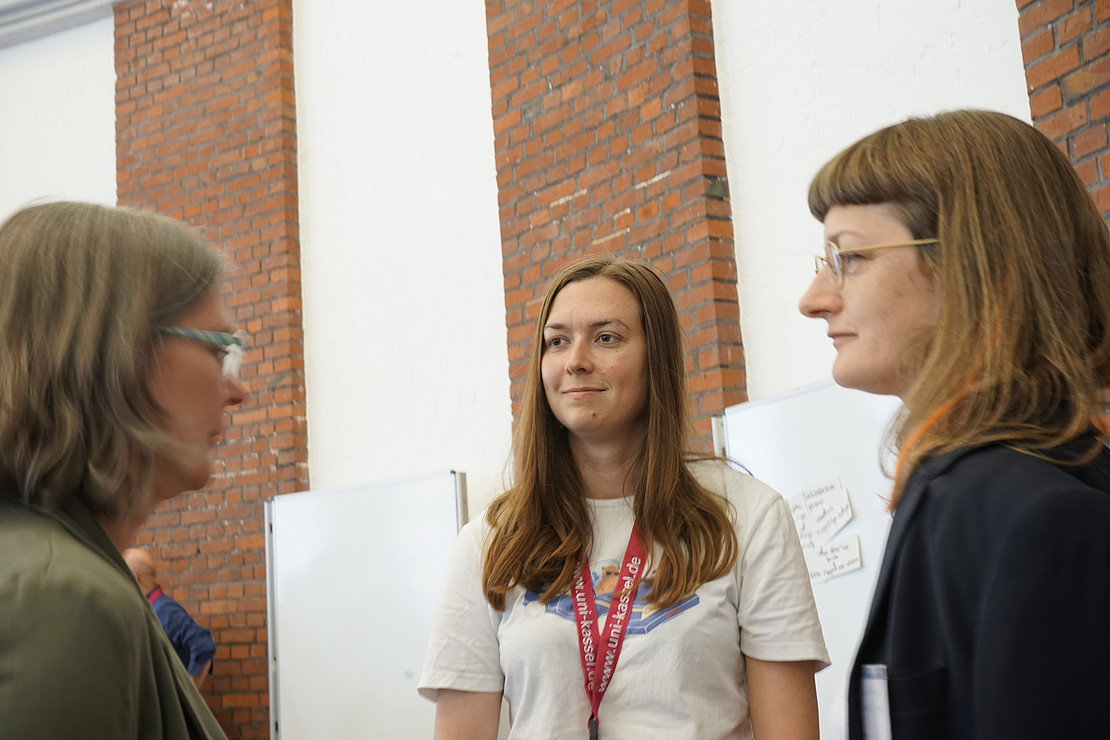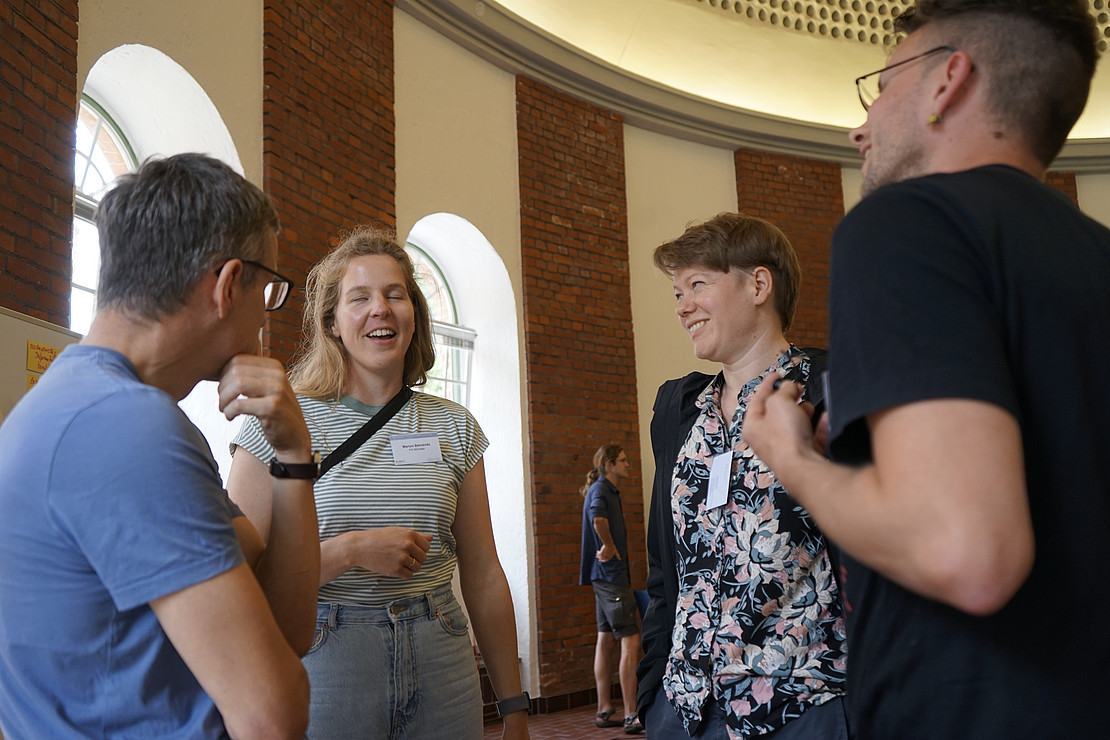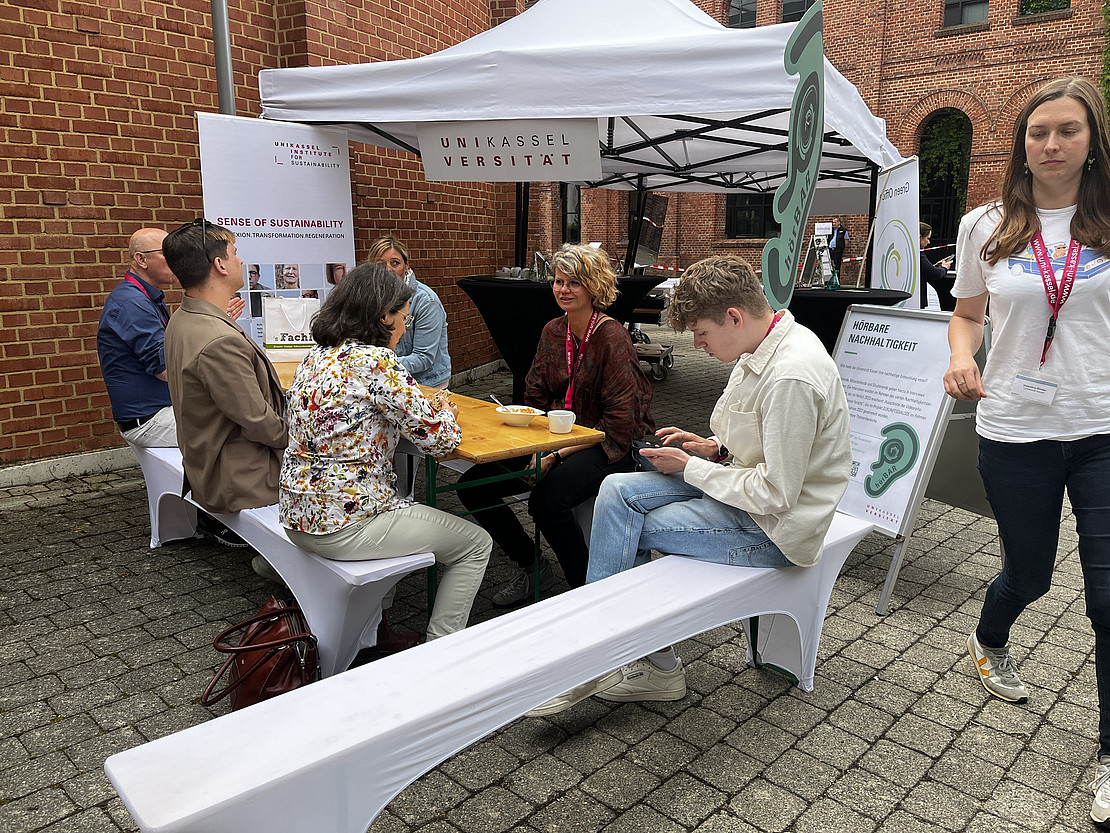General Meeting DG HochN
The content on this page was translated automatically.
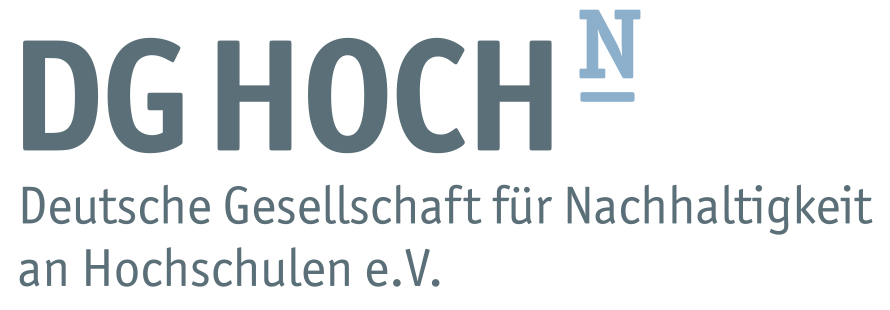
DG HochN Annual Hub 2023 - Shaping Transformation Together
Networking for sustainable development at theuniversity: Around 90 sustainability activists met at the DG HochN Annual Hub 2023 at the University of Kassel on June 26 and 27.
In cooperation with the Green Office and the Kassel Institute for Sustainability at the University of Kassel, both institutions are member universities of DG HochN, DG HochN invited all members and also other interested parties (non-members) to a face-to-face event including a general meeting on June 26 & 27, 2023 at the University of Kassel. The guiding principle of the event was "Shaping transformation together".
Impressions of the 1st day of the event (26.06.2023)
The event was opened by Prof. Georg Müller Christ, chairman of the DG HochN e.V. association. The president of the University of Kassel, Prof. Ute Clement, underlined in her speech the necessity of activities in the field of sustainability and the potential of universities to achieve something together.
On the first day of the event, in addition to the general meeting, the focus was not only on professional exchange, but also on active networking with other sustainability activists. For this purpose, market booths were set up, which presented the three institutions Green Office, Kassel Institute for Sustainability and SDGplus Lab and their activities, projects and work. In addition, guided tours were offered, during which the members of DG HochN gained insight into the structural development and climate adaptation strategies on the university's campus areas. In addition, all interested parties were also able to take a look behind the scenes of the technical university operations.
Impressions of the 2nd day of the event (27.06.2023)
On the second day of the event, the participants had the opportunity to exchange ideas on topics such as sustainability communication, sustainable procurement, equal opportunities and biodiversity management within the framework of parallel hubs, and to take part in a systemic constellation on how to deal with resistance to sustainability developments at universities.
With many new impulses and partly concrete implementation ideas, the networkers: inside left the Annual Hub 2023 with the invitation to the four Darmstadt universities for the Annual Hub 2024 in Darmstadt.
The impressions show some impressions of the event days. More photos are published on the website of DG HochN.
Program sequence
12:00 - 14:00 Arrival and registration
14:00 - 14:15 Start of the event and welcome address
Prof. Dr. Georg Müller-Christ (DG HochN, University of Bremen)
Prof. Dr. Ute Clement (President of the University of Kassel)
14:15 - 15:30 General Assembly 2023 of the DG HochN
15:30 - 16:00 Coffee Break and Marketplace
Organized by the Kassel Institute for Sustainability, UniKasselTransfer/ SDGplus Lab and the Green Office of the University of Kassel
16:00 - 17:00 Quo vadis DG HochN? - Board in discussion with the members
Prof. Dr. Georg Müller-Christ (DG HochN, University of Bremen)
This part of the event is open to those interested/including non-members.
Guided tour & On-site talk (1): "Holländischer Platz" - a campus is developing, Beata Lejman, Architect, Structural Development Planning, Department of Building, Technology and Real Estate
Formerly, today's university campus Holländischer Platz was used as an industrial site by Henschel, Gottschalk and Co. Even today, individual buildings and many a reminiscence amidst modern architectural trends are reminiscent of the former uses. Although the transformation process with a historical perspective is almost complete after 45 years, we are constantly developing.
In the tour, we would also like to address the topics of sustainability and accessibility in planning - two aspects that are essential for a modern design of the campus.
Regarding accessibility: The on-site tour may not be completely barrier-free due to different floor coverings.
Guided tour & On-site talk (2): "Guided tour on plant use - climate adaptation strategies on the Holländischer Platz campus", Prof. Dr.-Ing. Stefan Körner, Department of Landscape Architecture, Landscape Management and Vegetation Development
In the 1980s, the approach of the so-called Kassel School was followed on the public spaces of the Holländischer Platz campus. This theory of open space planning is essentially based on the idea that vegetation spontaneously establishes and stabilizes itself accompanying its use. However, a lot of work was done with the seeding of local wild plants and ornamental perennials were sown to increase the acceptance of the areas.
Since the early 2000s, the Department of Landscaping, Landscape Management and Vegetation Development has been studying the urban ecological value of the areas to determine which species have asserted themselves in the recording areas.
The guided tour shows the areas around the university, which resemble typical urban open spaces in terms of their conditions and exemplify the dynamic behavior of spontaneous and artificially established urban vegetation. On this basis, indications for a vegetation development adapted to climate change emerge.
Accessibility: The on-site visit may not be barrier-free due to inclines.
Guided tour & On-site talk (3): "In the basements of the university - a look behind the scenes of technical university operations, where energy consumption and energy efficiency meet",Dirk Schnurr, Energy Efficiency Manager, Department of Building, Technology and Real Estate.
In areas otherwise inaccessible to users, numerous aggregates and technical fixtures are installed to enable the university's operations. The guided tour allows you to immerse yourself in an unknown world and invites you to discover endless corridors and elaborate building services. During the tour, you will get to know the activities of the operating technology and gain an insight into the technical efforts that have to be made to ensure the smooth running of the university.
We will also address the topics of energy saving and energy efficiency. After all, the energy consumption of the University of Kassel is comparable to that of a small town and the potential for savings is correspondingly high.
Regarding accessibility: The on-site visit leads to the basements on the south campus, which are mostly reached via stairs; an alternative route (there and back) with an elevator would be possible.
This part of the event is open to interested parties/ also to non-members.
Evening Come Together
This portion of the event is open to those interested/including non-members. Professional exchange and networking in community-building formats
Hub 1
Sustainability communication bubble?
Collegial exchange on action-focused sustainability communication in the university environment
Chair: Eva Schäfer (DG HochN, h_da Hochschule Darmstadt)
In this hub, we would like to explore the question of how universities can effectively contribute to inspiring people both at our universities and in their respective social environments to take concrete action in the sense of sustainable development. On the one hand, the focus will be on the extent to which a "sustainability communication bubble" needs to be overcome. On the other hand, concrete ideas will be developed on how universities can increasingly address new non-academic target groups directly in order to be more effective outside of academic target groups.
Give and take: Hubs absorb the expertise and creativity of participants and provide guidance and energy.
Hub 2
Sustainable procurement management at universities
Chair: Vivien Führ (agado Society for Sustainable Development).
Eco-social procurement is an effective tool for implementing sustainable development. Universities can make an important contribution with their buying power. Here we want to discuss how sustainable procurement management can work in universities, what opportunities and challenges eco-social procurement holds and what support needs there are on the part of the universities. In the context of a group work, we want to work out how the network wants to approach the area of procurement in the future.
Hub 3
Biodiversity management of universities
Chair: Prof. Dr. Remmer Sassen (DG HochN, Dresden University of Technology)
Universities can contribute to the conservation of biodiversity by turning their campus into a living laboratory for species conservation and climate adaptation in order to prevent environmental damage caused, for example, by urbanization. Therefore, we want to discuss how universities can take a pioneering role and collect good examples of how to bring biodiversityfriendly projects to campus and raise awareness for biodiversity.
Hub 4
Equal opportunities at universities - innovation potential for ESD
Chair: Prof. Dr. Magdalène Lévy-Tödter (DG HochN, KCN Competence Center for Sustainable Development of the FOM University)
In this Hub, we will share innovative teaching and consulting formats that are currently being developed and implemented at universities in the context of diversity projects.
Established by the Kassel Institute for Sustainability, UniKasselTransfer/ SDGplus Lab and the Green Office of the University of Kassel.
Hub 5
Networks Hub: University networks on sustainability at German universities
Chair: Coco Klussmann (Dresden University of Technology)
Here, the networks will exchange information about their current main topics as well as their work. The idea is on the one hand to make the local networks visible, to strengthen them and on the other hand to motivate/initiate further networks, since higher education policy is a matter for the federal states and a bundling of competences and exchange with other stakeholder groups can have strong effects locally.
After online meetings, we now continue our series in persona here! In the World Café we will gather how the topics of funding, public relations, contact/involvement HS leadership, connection to politics are handled differently and discuss them.
Emergence: In Hubs, the framework is created for new things to emerge co-creatively.
Hub 6
ESD in university teaching
Chair: Prof. (em.) Dr. Ingrid Hemmer (DG HochN)
At the beginning, the structure of a digital advanced training in higher education didactics will be presented in a keynote speech. It will be explained which foundations it builds on, which elements it includes, which competencies it aims to promote and what effect it has had. Subsequently, further experiences with advanced training courses will be exchanged. Afterwards, the new portal "BNE Lehre konkret" will be presented, which can support university teachers in integrating ESD into their teaching.
Hub 7
Walking transformation paths together. The BMBF project traNHSform in exchange with our network.
Chair: Dr. Bror Giesenbauer, Claudia Pietsch, Julia Twachtmann, Carla Wemken (DG HochN).
We are all on the path of transformation pathways to a more sustainable future. In the BMBF project traNHSform , DG HochN, in cooperation with the German Rectors' Conference (HRK) and the Fraunhofer Institute for Systems and Innovation Research Karlsruhe (ISI), is accompanying ten collaborative projects on their transformation paths to more sustainable universities - with an eye to networking, creating synergies, sharing best practices and paving the way for future projects. To open the space to all, we would like to present the traNHSform project in this Hub and discuss with participants where paths cross and can be shared.
Hub 8
Understanding resistance to sustainability in universities - a systemic visualization
Chair: Prof. Dr. Georg Müller-Christ (DG HochN, University of Bremen)
There is a lot of talk about sustainability in higher education institutions, nevertheless the movements towards a more sustainable development in higher education institutions are very slow. Georg Müller-Christ visualizes in a systemic constellation with the participants why it is so difficult in universities to give the topic of sustainability so much importance that substantial changes can be made. Through the systemic visualization, the participants learn to better understand the university system and recognize their own possibilities for action.
Download program as PDF (667 KB)
Newsletter of the DG HochN
Since its foundation in 1971, the University of Kassel has had a historically grown focus on sustainability in research and teaching. In all departments, professorships with close links to sustainability are conducting research; both in the technical and natural sciences as well as in the humanities and social sciences, key aspects of sustainability are being addressed. Since 2022, the broad range of research and teaching related to ecological, economic and social sustainability has been bundled at the Kassel Institute for Sustainability, the new scientific center of the University of Kassel. In addition to the Kassel Institute for Sustainability, a profile-forming transfer laboratory will be established: the SDG+ Lab. The main pillars of the SDG+ Lab are new methods of research and development with society, dialogue, consulting, and the piloting and anchoring of solutions. The Green Office was set up for sustainability development in the University of Kassel's operations. The Green Office acts as a hub for sustainability and links all areas and members of the university and has the task of advancing the sustainable development of operational processes as a cross-departmental and cross-institutional task.
Contact the organizing team
Host:
University of Kassel
Green Office and Kassel Institute for Sustainability
E-Mail: greenoffice[at]uni-kassel[dot]de
Phone: +49 561 804-3737
Organizer:
German Society for Sustainability at Universities - DG HochN
E-mail: kontakt[at]dg-hochn[dot]de
